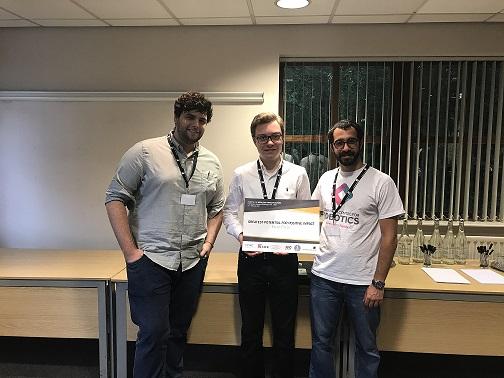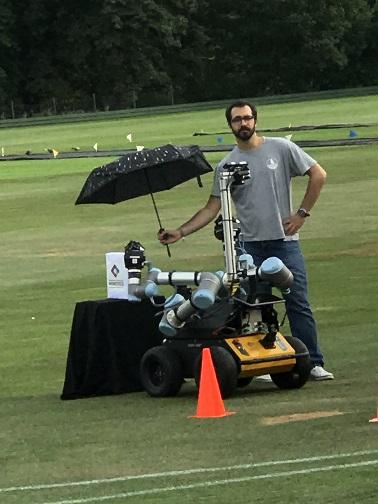Robots for Resilient Infrastructure Competition - 1st prize win!
The Robots for Resilient Infrastructure Competition was an International Robotics Challenge Event held at the University of Leeds June 27-28, 2017.
Wolfgang Merkt, Yiming Yang, Theodoros Stouraitis, Christopher Mower, Maurice Fallon and Sethu Vijayakumar
The Robots for Resilient Infrastructure Competition was an International Robotics Challenge Event held at the University of Leeds June 27-28, 2017. Its aim was to bring academics, industry, policy makers and stakeholders together to explore a future use of robots in the creation, inspection, repair and maintenance of critical infrastructure. The group won first prize for Greatest Potential for Positive Impact.
Robust Shared Autonomy for Mobile Manipulation with Continuous Scene Monitoring:
Abstract: This work presents a fully integrated system for reliable grasping and manipulation using dense visual mapping, collision-free motion planning, and shared autonomy. The particular motion sequences are composed automatically based on high-level objectives provided by a human operator, with continuous scene monitoring during execution automatically detecting and adapting to dynamic changes of the environment. The system is able to automatically recover from a variety of disturbances and fall back to the operator if stuck or if it cannot otherwise guarantee safety. Furthermore, the operator can take control at any time and then resume autonomous operation. Our system is flexible to be adapted to new robotic systems, and we demonstrate our work on two real-world platforms – fixed and floating base – in shared workspace scenarios. To the best of our knowledge, this work is also the first to employ the inverse Dynamic Reachability Map for real-time, optimized mobile base positioning to maximize workspace manipulability reducing cycle time and increasing planning and autonomy robustness.
The group presented their work on Robust Shared Autonomy for Mobile Manipulation in Extreme Environments which allows for shared autonomy operation via limited bandwidth wireless links. It empowers the human operator to use a blend of teleoperation, punctuated and full autonomy. The framework reduces operator fatigue by automatically verifying the validity of intended motions and continuously checking the environment for dynamic changes, altering the robot's behaviour along the way to ensure safety in shared workspaces while minimising dis- and interruptions.
This work has been accepted to appear at the IEEE Conference for Automation Science and Engineering (CASE) in Xi'an, China in August 2017.
Official Competition Demo: https://www.youtube.com/watch?v=jU-aAaYzF34&index=3&list=PLWViEDJit8HyK9...
Made In Leeds coverage: https://www.youtube.com/watch?v=JWtq5_uKyIA&index=4&list=PLWViEDJit8HyK9...



